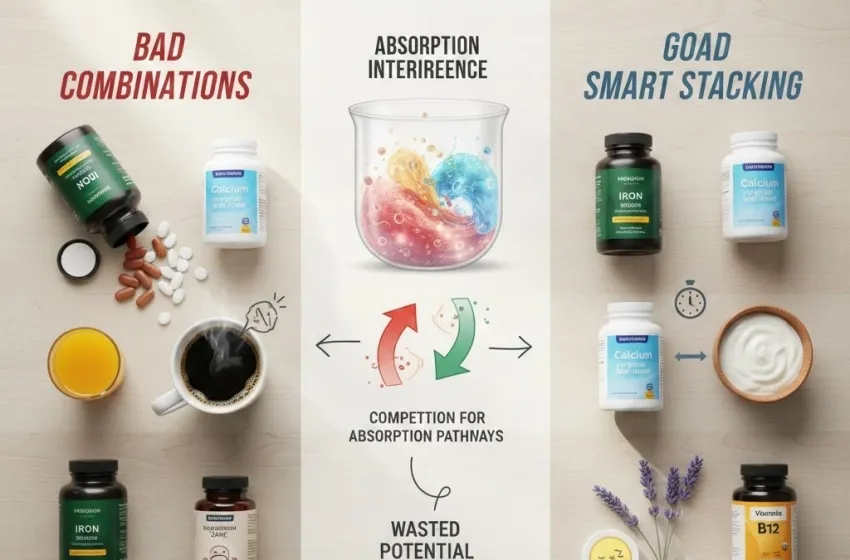Learn about absorption interference, magnesium/calcium timing, and why you shouldn't take iron with coffee.
Supplement stacking, the practice of taking multiple supplements together to achieve combined health or performance goals, can be a powerful tool in your wellness arsenal. However, without careful consideration, this practice can quickly turn into a waste of money—or worse, actively harm your nutrient absorption and overall health. The efficacy of your supplement regimen hinges not just on what you take, but when and how you take it.
Many enthusiasts fall victim to common stacking errors, believing "more is better" or that taking everything at once is simply the most convenient path. This is a common pitfall. The reality is that many vitamins and minerals engage in a fierce, albeit microscopic, competition for entry into your bloodstream. Ignoring these rivalries results in a phenomenon known as absorption interference, where one supplement actively reduces the uptake and efficacy of another.
This guide will expose the five most frequent and critical bad supplement combinations and provide practical, science-backed solutions to optimize your regimen. Understanding these interactions is the key to transforming your supplement routine from guesswork into a highly efficient strategy.
The Mineral Feud: Iron and Calcium
The most notorious example of absorption interference in the world of minerals is the clash between iron and calcium. These two essential nutrients are vital for distinct, non-overlapping physiological processes—iron for oxygen transport and energy, and calcium for bone health and muscle function. Yet, when ingested simultaneously, they become fierce competitors in the small intestine.
Why They Clash: Competition for Absorption Pathways
The primary issue is that iron and calcium compete for the same transport mechanisms in the gut. The non-heme iron (the type found in supplements and plant-based foods) and calcium utilize similar pathways to cross the intestinal wall into the bloodstream. When a high dose of one is introduced, it effectively "clogs" the shared pathway, significantly reducing the absorption of the other.
Research indicates that calcium, even in moderate doses (around 300 mg), can inhibit non-heme iron absorption by as much as 50–60%. This is particularly critical for individuals with iron deficiency anemia who rely on supplementation to restore their levels. This mineral rivalry is a classic example of a bad supplement combination that renders both supplements less effective than they should be.
The Fix: Separation is Salvation
The solution is simple: do not take iron and calcium supplements at the same time.
- Iron: Should be taken on an empty stomach with a source of Vitamin C (like orange juice or a Vitamin C supplement), as Vitamin C dramatically enhances non-heme iron absorption. Take it in the morning or mid-day, entirely separate from meals or other minerals.
- Calcium: Best taken with food to improve absorption, especially calcium carbonate. Space your calcium dose at least 2 to 4 hours away from your iron supplement. If you use calcium for sleep, take it with your evening meal.
The Nighttime Conflict: Magnesium and Calcium Timing
Magnesium and calcium are often packaged together in supplements aimed at bone health or muscle relaxation, leading many to believe they are a harmonious pairing. While they are both crucial minerals and work synergistically in the body for processes like muscle contraction and relaxation, they should generally be taken separately, especially in the context of sleep and mineral optimization.
Why They Clash: Absorption and Relaxation Trade-offs
Similar to the iron/calcium conflict, high doses of calcium and magnesium taken simultaneously can compete for intestinal transporters, leading to reduced absorption of both. However, the timing issue is also crucial here—specifically the magnesium/calcium timing for maximizing the relaxing benefits of magnesium.
- Absorption: When you ingest a large dose of calcium, it can hinder magnesium absorption in the gut. If both are taken together, you risk a lesser uptake of the calming magnesium.
- Action for Sleep: Magnesium is renowned for its ability to promote relaxation by supporting GABA receptors and calming the nervous system. For this reason, it is frequently recommended as a pre-sleep supplement. Calcium, however, can have an energizing effect, and when taken too close to bedtime, it can potentially counteract the sedative effects of magnesium.
The Fix: Divide and Conquer for Deep Sleep
The best practice for optimizing your magnesium/calcium timing involves strategic separation.
- Magnesium: For relaxation and sleep, take your magnesium supplement (forms like glycinate or L-threonate are often preferred) about 1–2 hours before bed. Taking it away from your high-calcium meal (like a glass of milk or cheese) ensures optimal absorption and maximizes its calming effect.
- Calcium: Take your calcium supplement earlier in the day—with breakfast or lunch. This ensures you still meet your daily requirement without interfering with your sleep-promoting magnesium later on. This avoids the classic stacking errors that diminish efficacy.
The Caffeine Conundrum: Iron with Coffee and Tea
Beyond mineral-mineral competition, one of the most common and overlooked stacking errors is combining iron supplements with everyday beverages like coffee or tea. This is a critical mistake, especially for those with low iron stores, as the compounds in these drinks are potent inhibitors of iron absorption.
Why They Clash: The Polyphenol Problem
The issue lies in the high concentration of polyphenols and tannins found in coffee, black tea, and green tea. These compounds are antioxidants, but they also have a strong affinity for binding to non-heme iron in the gut.
This chemical binding creates an insoluble complex that the body simply cannot absorb. Taking iron with coffee or tea is a direct path to significantly reduced iron bioavailability. Studies have shown that a single cup of coffee can reduce iron absorption from a meal by up to 60%, making this an incredibly pervasive and significant absorption interference issue.
The Fix: Hydrate Wisely
The rule here is absolute: Avoid coffee and tea near your iron supplement.
- Iron: Take your iron supplement with water or orange juice (for the Vitamin C boost) on an empty stomach.
- Timing: Wait at least 1 to 2 hours after taking your iron supplement before consuming coffee, black tea, green tea, or red wine. This buffer time allows the iron to be absorbed before the inhibitory polyphenols are introduced.
The Trace Mineral Tug-of-War: High-Dose Zinc and Copper
Zinc and copper are both trace minerals essential for immune function, enzyme activity, and metabolism. They are often included in multivitamins, but when supplemented individually in high doses—particularly zinc—they become another example of bad supplement combinations due to a competitive relationship.
Why They Clash: Shared Transporters
Zinc and copper utilize similar transport proteins in the small intestine for absorption. When zinc is taken in high doses over an extended period, it aggressively outcompetes copper for these transport sites. The result is a reduced uptake of copper, which, in severe cases, can lead to a secondary copper deficiency. This deficiency is a serious complication, as copper is crucial for iron metabolism, energy production, and nerve health.
This competition for absorption pathways highlights why indiscriminate stacking errors with minerals can be detrimental. High-dose zinc—often taken for immune support—is a well-documented cause of induced copper deficiency.
The Fix: Balance and Moderation
Preventing this trace mineral imbalance requires a strategy of balance and caution:
- Moderate Doses: Stick to the recommended daily intake for zinc (usually 15 mg or less) to minimize interference.
- Balance the Stack: If you need to take a high-dose zinc supplement (e.g., 40 mg or more for a short-term immune boost), it is highly recommended to also supplement with a small dose of copper to maintain balance, often using a ratio of 10:1 to 15:1 (Zinc:Copper).
- Separate Timing: For optimal absorption of both, if you take them separately, space them out by at least 2 hours.
The B12/C Mix-Up: Vitamin C and Vitamin B12
While less common than mineral rivalries, an interaction exists between high doses of Vitamin C (ascorbic acid) and Vitamin B12 (cobalamin), making them an unexpected pair of bad supplement combinations.
Why They Clash: Chemical Degradation
Vitamin C, an antioxidant, can chemically react with Vitamin B12 in the digestive tract, particularly when the B12 is taken in its non-protected form. This reaction has the potential to degrade the B12 molecule, rendering it inactive and reducing its bioavailability. While the effect is dose-dependent and typically requires very high doses of Vitamin C, it's a known potential for absorption interference that should be easily mitigated.
For individuals with diagnosed B12 deficiency (who often require high supplemental doses), ensuring maximum absorption is crucial, making this a relevant stacking error to avoid.
The Fix: Time is the Key Nutrient
The interaction can be easily bypassed by separating the intake of these two water-soluble vitamins.
- Timing: Take your Vitamin C supplement in the morning or with a meal, and separate your Vitamin B12 supplement by at least 2 hours. For example, take B12 with breakfast and Vitamin C with lunch or dinner.
- B12 First: Since B vitamins are often associated with energy, taking them earlier in the day is also a good strategy that neatly separates the dosing.
A Guide on Which Supplements Should Never Be Taken Together
Understanding the concept of competition for absorption pathways is fundamental to designing an effective supplement stack. Minerals and fat-soluble vitamins, in particular, often vie for the same limited mechanisms in the gastrointestinal tract. This means taking large amounts of competing nutrients at the same time is a common source of stacking errors.
Here is a summary of crucial pairs to avoid taking simultaneously:
| Competing Supplements | Rationale for Separation | Optimal Timing Strategy |
|---|---|---|
| Iron and Calcium | Calcium severely inhibits non-heme iron absorption. | Iron in the morning with Vitamin C. Calcium 2–4 hours later with food. |
| Magnesium and Calcium | Compete for absorption; calcium may negate magnesium's relaxing effect for sleep. | Calcium with breakfast/lunch. Magnesium 1–2 hours before bed. |
| Zinc and Copper | High-dose zinc can block copper absorption and lead to deficiency. | Take them at least 2 hours apart, or use a balanced Z:Cu supplement. |
| Vitamin C and Vitamin B12 | High-dose Vitamin C can chemically degrade B12 in the gut. | Separate intake by 2 hours (e.g., B12 in morning, C in afternoon). |
| Fat-Soluble Vitamins (A, D, E, K) | Compete for absorption when taken in very high doses. | Should always be taken with a fat-containing meal for best absorption. |
The most effective strategy to overcome absorption interference is to view your day as a schedule for nutrient delivery. Instead of consuming all your supplements at once, spread them out into morning, noon, and evening doses. This simple change allows each nutrient the necessary time and space to utilize its specific absorption pathway effectively, maximizing the benefit of your stack.
Optimizing Your Supplement Routine: Best Practices
Avoiding bad supplement combinations and maximizing absorption extends beyond the five critical mistakes listed above. Here are essential best practices:
- Know Solubility: Fat-soluble vitamins (A, D, E, K) must be taken with a meal containing dietary fat (like avocado, nuts, or oil) for proper absorption. Water-soluble vitamins (B-complex, C) can be taken with or without food, though often best with a light meal to prevent stomach upset.
- Read the Label: Many multivitamins contain high doses of competing minerals (like calcium, iron, and zinc) in a single pill. While convenient, the competitive dose may mean you're absorbing less of each than you realize. If you have a specific deficiency (e.g., iron), it’s often better to supplement that nutrient individually and time it correctly, separate from your multi.
- Consult a Professional: Before starting any complex supplement stack, especially if you have an underlying health condition, are pregnant, or are taking medication, consult a healthcare provider or a Registered Dietitian. They can assess your individual needs, identify potential drug-nutrient interactions, and help you avoid serious stacking errors.
By applying these strategic timing and pairing principles, you move away from simple guesswork and toward a truly optimized approach to supplementation, ensuring you get the full value from every capsule and pill.



































